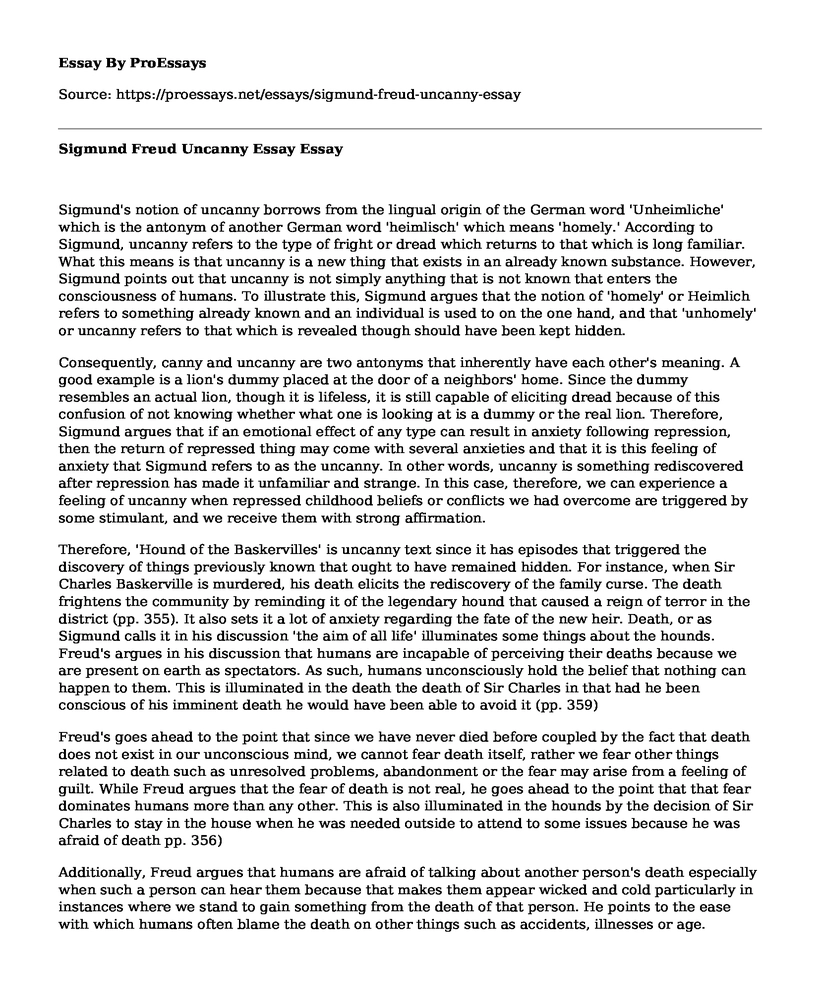Sigmund's notion of uncanny borrows from the lingual origin of the German word 'Unheimliche' which is the antonym of another German word 'heimlisch' which means 'homely.' According to Sigmund, uncanny refers to the type of fright or dread which returns to that which is long familiar. What this means is that uncanny is a new thing that exists in an already known substance. However, Sigmund points out that uncanny is not simply anything that is not known that enters the consciousness of humans. To illustrate this, Sigmund argues that the notion of 'homely' or Heimlich refers to something already known and an individual is used to on the one hand, and that 'unhomely' or uncanny refers to that which is revealed though should have been kept hidden.
Consequently, canny and uncanny are two antonyms that inherently have each other's meaning. A good example is a lion's dummy placed at the door of a neighbors' home. Since the dummy resembles an actual lion, though it is lifeless, it is still capable of eliciting dread because of this confusion of not knowing whether what one is looking at is a dummy or the real lion. Therefore, Sigmund argues that if an emotional effect of any type can result in anxiety following repression, then the return of repressed thing may come with several anxieties and that it is this feeling of anxiety that Sigmund refers to as the uncanny. In other words, uncanny is something rediscovered after repression has made it unfamiliar and strange. In this case, therefore, we can experience a feeling of uncanny when repressed childhood beliefs or conflicts we had overcome are triggered by some stimulant, and we receive them with strong affirmation.
Therefore, 'Hound of the Baskervilles' is uncanny text since it has episodes that triggered the discovery of things previously known that ought to have remained hidden. For instance, when Sir Charles Baskerville is murdered, his death elicits the rediscovery of the family curse. The death frightens the community by reminding it of the legendary hound that caused a reign of terror in the district (pp. 355). It also sets it a lot of anxiety regarding the fate of the new heir. Death, or as Sigmund calls it in his discussion 'the aim of all life' illuminates some things about the hounds. Freud's argues in his discussion that humans are incapable of perceiving their deaths because we are present on earth as spectators. As such, humans unconsciously hold the belief that nothing can happen to them. This is illuminated in the death the death of Sir Charles in that had he been conscious of his imminent death he would have been able to avoid it (pp. 359)
Freud's goes ahead to the point that since we have never died before coupled by the fact that death does not exist in our unconscious mind, we cannot fear death itself, rather we fear other things related to death such as unresolved problems, abandonment or the fear may arise from a feeling of guilt. While Freud argues that the fear of death is not real, he goes ahead to the point that that fear dominates humans more than any other. This is also illuminated in the hounds by the decision of Sir Charles to stay in the house when he was needed outside to attend to some issues because he was afraid of death pp. 356)
Additionally, Freud argues that humans are afraid of talking about another person's death especially when such a person can hear them because that makes them appear wicked and cold particularly in instances where we stand to gain something from the death of that person. He points to the ease with which humans often blame the death on other things such as accidents, illnesses or age. Sigmund points out that humans even go ahead to harbor feelings of admiration for the dead people from achieving what they perceive as a difficult task. Sigmund then wonders how humans readily accept the deaths of their enemies or strangers are quick to sentence them to death without any hesitation just like primitive men did in the past. Such men hold death-wishes against their enemies and other people they don't like following the death of Sir. Charles, most people, readily forgot about it and started pondering over the fate of the new heir (pp. 355). Only his relatives and close friends continued to mourn him (pp. 355).
To deal with the death of close relatives and friends, Sigmund argues that humans create other forms of existence after death such as spirits and the concept of life after death. These he demonstrates as methods by which humans deny death. This is seen in the hounds in forms of the supernatural that Holmes is said to overpower and the curses talked about in the book.
Work Cited
Freud, Sigmund. "The'uncanny'. Standard Edition (Vol. 17, pp. 218-256)." Google Scholar (1919).
Cite this page
Sigmund Freud Uncanny Essay. (2022, Mar 29). Retrieved from https://proessays.net/essays/sigmund-freud-uncanny-essay
If you are the original author of this essay and no longer wish to have it published on the ProEssays website, please click below to request its removal:
- Simulant Medication and Patients Without Mental Health Problems
- Research Paper on Anxiety in Children
- MSI Form Description Paper Example
- Social Work in Reducing Recidivism Paper Example
- Essay Sample on Treating Neurocognitive Disorder: Delirium & Its Symptoms
- Essay Sample on Psychodynamic Psychotherapy: Understanding Unconscious Elements
- Essay on Panic Disorder Prevalence in Primary Care: Addressing Mental Health Needs







